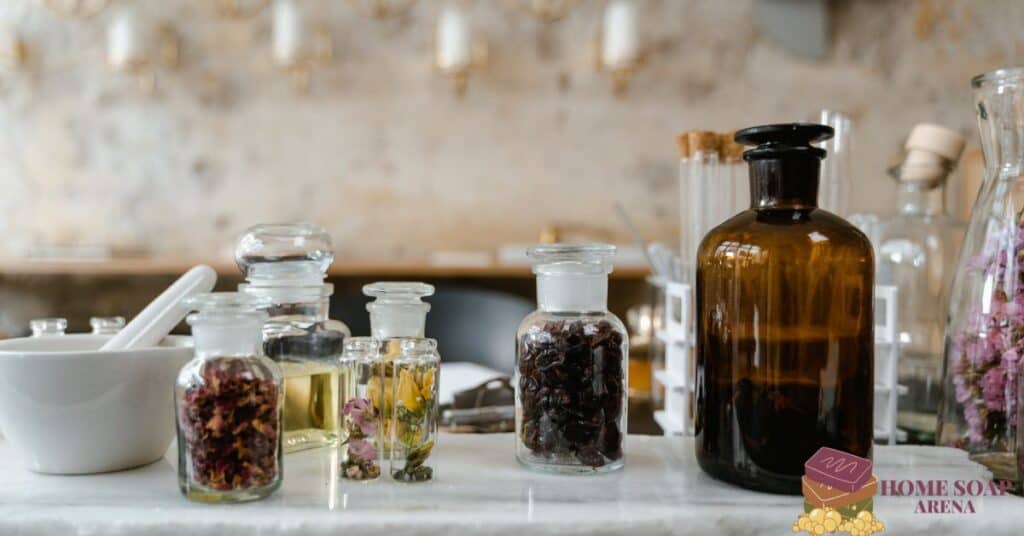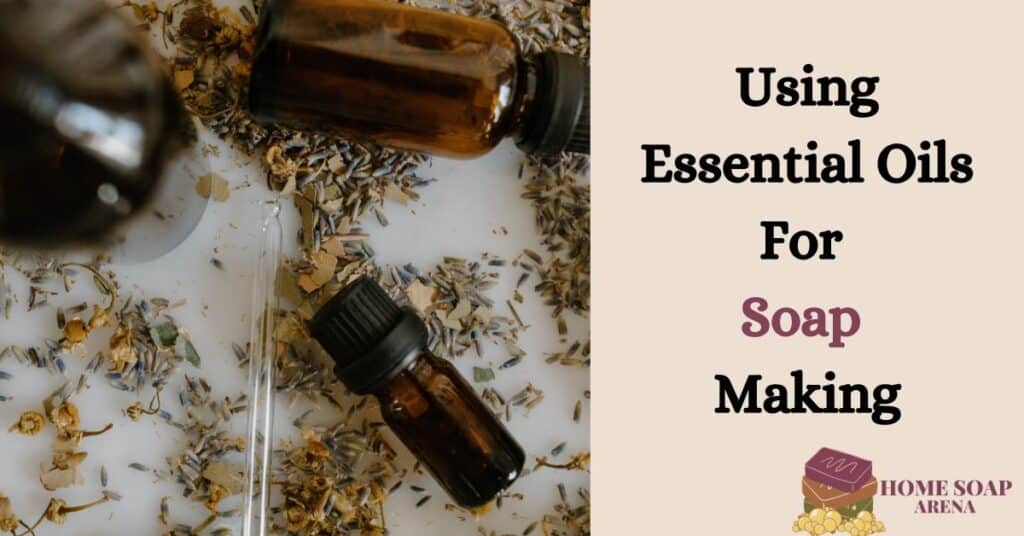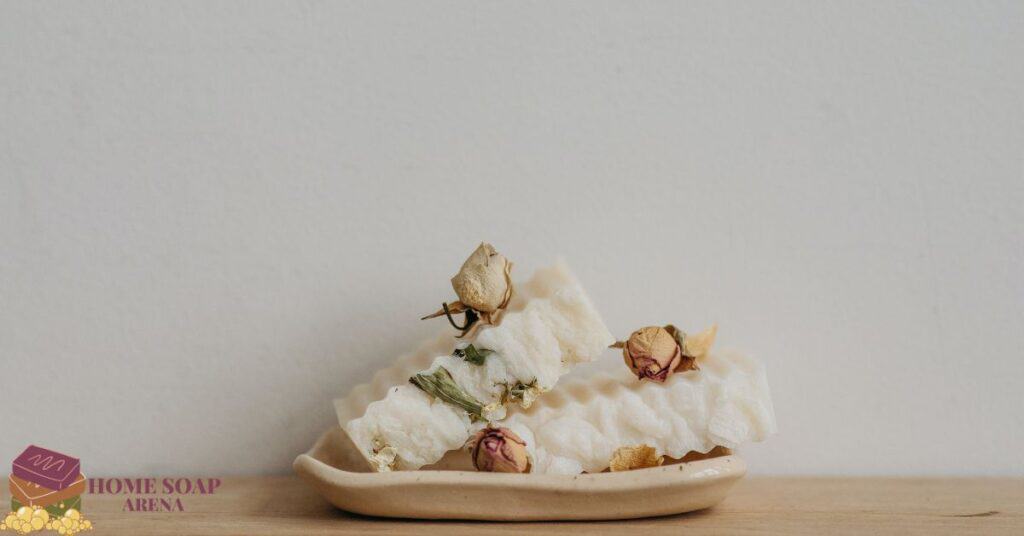Table of Contents
- Which Essential Oil Is Best For Soap Making
- 1. Essential Oil of Lavender
- 2. Essential Oil of Lemon
- 3. Essential Oil of Clary Sage
- 4. Essential Oil of Tea Tree
- Is There A Canadian Essential Oil Company
- How Much Essential Oil Per Kg Of Soap In Canada
- Can You Use Regular Essential Oils In Soap Making
- Final Thought
Do you want to know the Essential oils for soap making in Canada? I will show you where to get the essential oils for soap making in Canada.
When I moved to Canada, I didn’t know where to get all the essential oils I needed for my soaps.
But after some weeks of research, I got it all, which I will share with you.
First and foremost, it’s important to note that Voyageur Soap and Candle is a well-known Canadian supplier, providing a wide range of 100% pure, therapeutic-grade essential oils, organic pure essential oils, essential oil compounds, essential oil mixes, and massage diffusers.
These products are competitively available, catering to various aromatherapy and soap-making requirements.
Read on for a list of essential oils and their purposes as I delve into everything critical oils in Canada’s soap-making.
Let’s get started.
Which Essential Oil Is Best For Soap Making
These oils can be used with other essential oils or used alone to create soaps with different properties and enticing fragrances.
When manufacturing soap, the following essential oils work best:
1. Essential Oil of Lavender
Because of its herbaceous and flowery undertones, Lavender Essential Oil is appropriate for a wide range of soaps.
It is one of the most extensively utilized essential oils today, even available in pharmacy shops.
However, you must proceed cautiously since only pure and organic lavender essential oil is acceptable for the skin.
The compatibility of this essential oil with practically all of the materials needed to produce soap is a benefit.
You may also easily combine them with other essential oils to create blends.
It is also one of the most economical and crucial oils if you want to maintain quality.
It soothes your skin while also improving its suppleness and texture.
2. Essential Oil of Lemon
Lemon Essential Oil lightens the skin and acts as an exfoliator. Due to its benefits, numerous soap manufacturers incorporate it into their products.
This essential oil benefits the epidermis due to its high antioxidant content. These antioxidants preserve your skin while keeping it looking fresh.
Because lemon essential oil contains a high concentration of citric acid, only a few droplets are necessary to enhance the overall quality of your soaps.
Your customers will also like the stimulating lemon smell, leaving them feeling optimistic and active after each bath!
3. Essential Oil of Clary Sage
Clary sage essential oil is a fantastic choice for adding herbal and earthy fragrances to your soaps. It also has subtle fruity and flowery overtones, giving your soap bars a particular aroma.
Clary sage essential oil might be difficult to locate in stores and shops, but it is easy to find online.
Pure variations should be sought, while dummy versions should be avoided.
It also blends beautifully with bergamot, cedar wood, ylang-ylang, and lemon essential oils.
4. Essential Oil of Tea Tree
Tea tree essential oil smells very herbal and camphorous, in addition to being beneficial to the skin. This fragrance might help to distinguish the aroma of your soaps.
It also assists in the reduction of stress and anxiety.
As a result, it enhances the overall appeal and utility of the soap bars when they are used. Luxury soap bar makers use it because it treats many skin ailments.
Combine the soap with citrus or spicy essential oils to give it a powerful, alluring scent.
Clary sage, orange, rosemary, and bergamot essential oils are all beautiful combinations with tea tree essential oils.
Because of its extensive medical and therapeutic benefits, utilizing it as a single essential oil in soaps is also more than enough.
Is There A Canadian Essential Oil Company
Yes, that’s the answer. We bottle all our essential oils here in Vancouver, BC, at Fern & Petal.
Our goods are made with natural ingredients, so they don’t have any colors, fragrances, or artificial preservatives.
We care about the environment and the people around us, so we give $1 to plant a tree for every buy.
Fern & Petal was started because it took a lot of work to find natural, high-quality goods made in the area.
We are a small, family-run business that puts quality first. That’s why all our goods are made by hand and bottled locally in Vancouver, BC, Canada.
We have two goals:
1) to help our customers feel safe knowing that their goods are all-natural and of the best quality.
2) to Make the world a better place for everyone by being sustainable and planting trees for every order.
How Much Essential Oil Per Kg Of Soap In Canada
Around 20ml fragrance per Kilo of soap (2%) is needed for a noteworthy aroma.
Therefore, a few drops of every single bar is sufficient.
A maximum of 3% fragrance addition is often recommended as a guideline.
Depending on their makeup, iridescent powders or glitters may float or sink to the bottom of a mold; thus, a suspending base may be helpful to avoid this.
Also, glitters and sheens can be lost if used in excess, so use caution for the best effects.
Stir together all of these ingredients rapidly and pour into whichever mold you’re using before a skin forms since this will ruin the gloss of the final bar.
Nothing prevents you from quickly re-heating the combination while it is still in its microwaveable container, but remember that a few seconds is all it will require.
Excessive heat will remove the aroma, so avoid it if possible.
Avoid introducing bubbles into the soap mixture, which will also detract from the final appearance.
The mixture begins to set fast, trapping any bubbles or other flaws, which is especially problematic when making translucent soap with a clear base.
If you have access to denatured alcohol (rubbing alcohol is available from certain chemists), ‘spritzing’ the surface of the soap with alcohol shortly after pouring will remove surface bubbles and produce a more excellent finish.
A license from HMRC is required to get TSDA (trade-specific-denatured-alcohol), which is the proper product. This license is free, but it must be applied appropriately.
Can You Use Regular Essential Oils In Soap Making
Although essential oils can be used in any soap-making method, using a Melt and Pour base is the easiest option.
As a general guideline, your essential oil (single or blended) should be roughly 3% of the weight of a soap bar. Here’s how to figure out how much essential oil you’ll need:
Assume the bar of soap will be 100g in weight. Based on the 3% ratio, 3g of essential oil is required to scent the soap.
To calculate the correct amount of essential oil measured in milliliters, divide the required gram amount by 0.9. If you want 3g of essential oil, the milliliter equivalent is 3.3ml.
As a general guideline, 22 drops of essential oil equals 1.1ml (1g). So, 66 slides are required to generate 3g of essential oil (3% of a 100g bar).
If this is your first time creating essential oil soap, you may want to reduce the proportion to 1% (22 drops).
The soap will still be fragranced (remember, essential oils are pretty intense), and the lesser amount reduces the possibility of severe reactions.
Finally, if you wish to use soap on your face, use a 1% solution.
Because facial skin can be susceptible, diluting the essential oils in these recipes is usually a good idea.
Final Thought
Now that we have established the Essential oils for soap making in Canada, I am also aware that essential oils are concentrated plant essences that should always be diluted before being applied to the skin to avoid irritation.
Essential oils are naturally volatile molecules with a pleasant odor. They are generally separated using the hydrodistillation method, which is more appropriate for this operation and more accessible.
Each essential oil has a unique chemical makeup, influencing the scent, absorption, and impact on the body.
I do not advocate or encourage the internal use of essential oils, but rather its aromatic and topical advantages.



